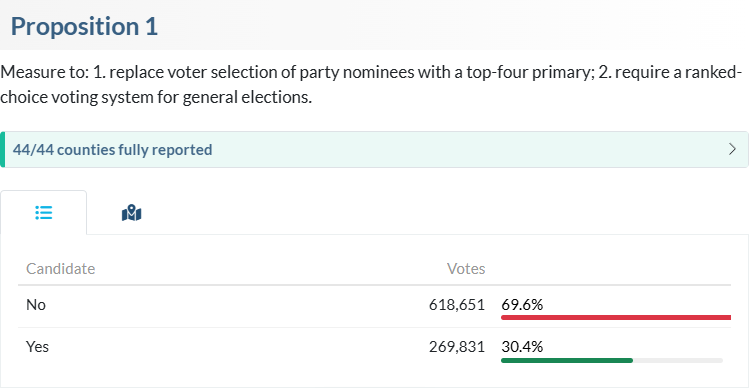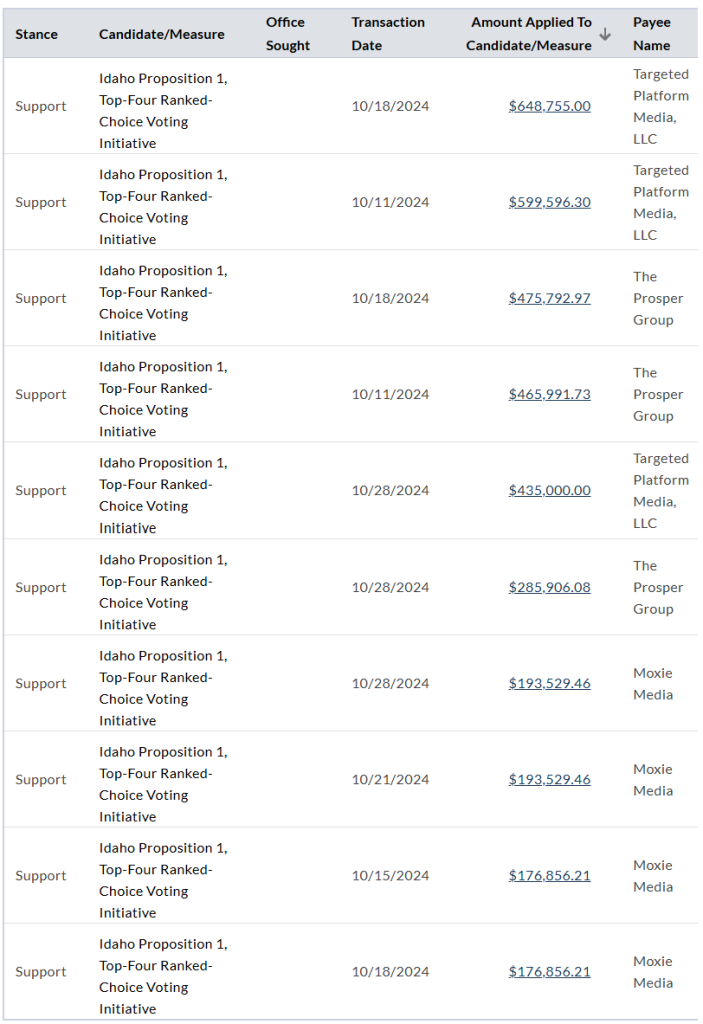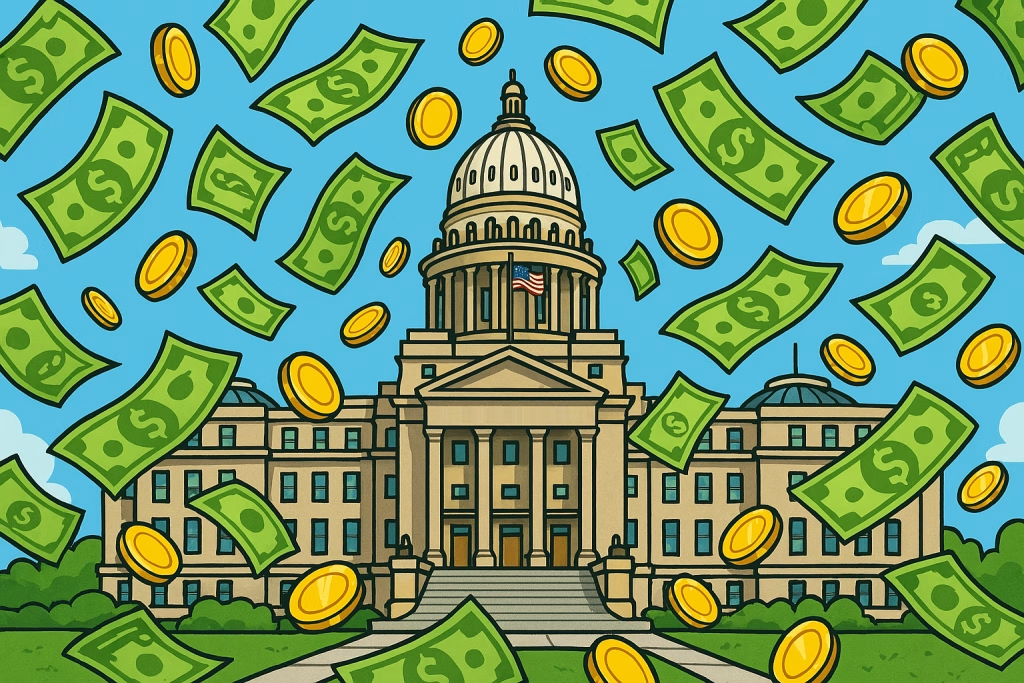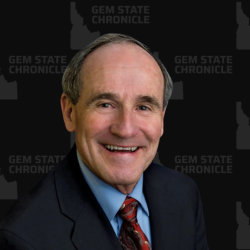It’s a common belief that money influences election outcomes. Candidates who raise substantial funds and benefit from well-funded PACs often emerge victorious. This perception fosters the idea that politics is dominated by wealthy and powerful special interests, effectively excluding ordinary people from meaningful participation.
Yet that perception has recently been challenged by reality. I’m sure you’ve heard that Kamala Harris raised more than a billion dollars, dropping seven figures apiece on singers and celebrities to appear at her rallies to drive the illusion of popular support. Her unsuccessful campaign now finds itself in debt, a reminder of the bullet we dodged by not electing someone so profligate with money.
On the other hand, Donald Trump raise around a third of that amount and won the election. It makes me wonder if members of the Harris campaign knew defeat was inevitable and sought to launder the old Joe Biden war chest to friendly destinations in the process.
Here in Idaho, opponents of Proposition 1 were beginning to worry as six and seven figure checks were funneled into the pro side’s chest. According to Idaho Sunshine, Idahoans for Open Primaries spent $5,075,622.64 in support of Prop 1 during the election cycle. (That number could increase after November reports are filed.) Prop 1 was defeated in a landslide, gaining fewer “yes” votes than Kamala Harris. Not only did this result belie the claim that Prop 1 was a bipartisan initiative, it also clearly demonstrated that all the money in the world will not necessarily convince people to vote for a clearly bad idea.

269,960 people voted to implement a top four jungle primary and ranked choice voting in Idaho. That means that Idahoans for Open Primaries, and its big out-of-state left-wing benefactors, spent $18.80 per vote. Ouch.
To compare, I did the same math for the district 15 senate race, one of the most contested in the state. Codi Galloway spent $111,433.73 to defeat Sen. Rick Just, earning 12,846 votes for an average of $8.67 per vote.
On the other hand, all that money went somewhere, right? Nearly $1.7 million went to a firm called Targeted Platform Media LLC, which is apparently based in Maryland. The firm’s website is spartan, but a 2020 FEC complaint alleged that Targeted Platform Media was the alter ego of a political consulting firm called Buying Time LLC, and that the two organizations illegally colluded in a Kentucky US Senate race.
Another $1.5 million went to The Prosper Group, an Indiana-based digital media firm that counts Republicans like Sen. Tommy Tuberville of Alabama and Sen. Ted Cruz of Texas as its clients.
Just over $900,000 went to Moxie Media, a Seattle-based direct mail firm that boasts of being women-owned. Its client list is a who’s who of far left organizations.

Payouts to these three vendors constituted nearly 80% of spending by Idahoans for Open Primaries. Despite Prop 1 losing in a landslide in Idaho, these firms in Maryland, Indiana, and Washington made out like bandits. Considering that about 80% of donations came from out-of-state, it seems accurate to say that the end result of the Prop 1 campaign was the direct transfer of $4 million from leftist organizations to political consulting firms using Idaho as the middleman.

I see a few lessons in these numbers. First, I need to charge more for political consulting. I could lose a multi-million dollar campaign by nearly 40% for much less than these firms cost. Seriously though, good political consulting is worth every penny, but there are a lot of firms out there bilking candidates and their donors for all they’re worth. It seems like a market that is ripe for disruption and reform.
Second, money doesn’t necessarily buy votes. The Idaho GOP spent a fraction of what Idahoans for Open Primaries did, yet its message resonated much more soundly with voters. “Don’t Californicate Idaho’s Elections” was a simple and provocative message that left an indelible mark on those who saw it. Other organizations such as Secure Idaho Elections, One Person One Vote, and Idahoans for Fair Elections also did a lot more with much less money.
After Reclaim Idaho successfully introduced Medicaid Expansion in 2018 via the ballot initiative, many came to fear its power of organization and getting out the vote. This was likely a major reason that Gov. Brad Little called a special session of the Legislature in September 2022 to divert $400 million to education as a way of obviating Reclaim’s tax hike initiative that year.
However, this defeat shows that Reclaim Idaho and its allies are not invincible. They succeeded in uniting a broken Idaho GOP against the attempt to rewrite our election laws. When they come back again, perhaps to legalize abortion, we can be confident that a united front and solid messaging can defeat an army of paid signature gatherers and a gold plated campaign.
It’s true that you need money to win a campaign, but money is not enough. You need a message, and the people of Idaho were clearly not interested in the message that backers of Prop 1 were selling. As we approach another legislative session, during a time when it feels like anything is possible, let’s focus on refining a conservative message that truly resonates with the people of Idaho.
Gem State Chronicle is a reader-supported publication. To receive new posts and support my work, consider becoming a free or paid subscriber.
About Brian Almon
Brian Almon is the Editor of the Gem State Chronicle. He also serves as Chairman of the District 14 Republican Party and is a trustee of the Eagle Public Library Board. He lives with his wife and five children in Eagle.













